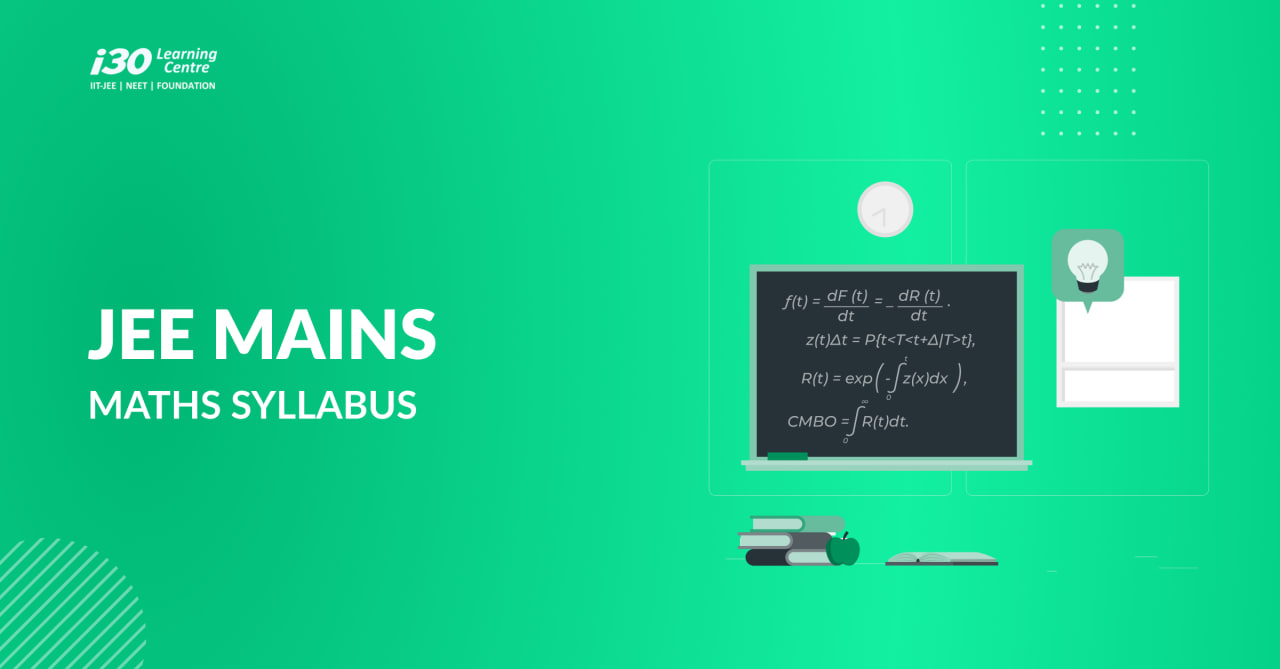If you’re planning to appear for the JEE Main exam in 2023, it’s essential to have a thorough understanding of all the sections, among which the Mathematics section is often considered the most challenging by students. So, this article will mainly focus on JEE Main Maths syllabus 2023 which covers a wide range of topics, from algebra to calculus, and it’s crucial to have a solid grasp of these concepts to perform well on the exam.
In this article, we’ll take a closer look at the JEE Main Maths syllabus for 2023 and provide you with valuable insights, tips, and resources to help you prepare effectively for the exam.
With the 2023 JEE Main exam just around the corner, it’s important to start preparing early to ensure that you’re fully equipped to tackle the Maths section of the exam.
JEE Mains
Joint Entrance Examination – Main (JEE-Main), formerly known as the All India Engineering Entrance Examination (AIEEE), is an Indian standardized computer-based test for admission to many technical undergraduate courses in engineering, architecture, and planning across colleges in India.
The exam is carried out by the National Testing Agency(NTA). The core committee of the NTA decides the syllabus for the 2023 examination.
For better understanding and easy preparation for JEE Mains, a student needs to know the entire exam pattern, syllabus, and topic-wise weightage. The JEE 2023 syllabus consists mostly of topics from NCERT books for 11th and 12th-class Physics, Chemistry, and Mathematics subjects.
By using the JEE 2023 chapter-wise weightage of the syllabus, the students will be able to know the topics that need to be focused on and prepare accordingly for NTA JEE Main 2023. Every year, there is some variation in the syllabus and weightage of JEE Main 2023.
Structure and Syllabus
To score well in the Mathematics section of JEE Main 2023, it is important for candidates to have a clear understanding of the structure and syllabus of the exam. The JEE Main Maths Syllabus 2023 is designed to test the candidates’ understanding of mathematical concepts and their ability to apply them in problem-solving.
JEE Mains is a three-hour undergraduate-level exam with a total of 300 marks. The exam medium is in 13 languages. Talking about exam patterns and marking schemes, they both are quite simple. The exam consists of multiple choice questions, where 4 marks are allotted for a correct answer and 1 mark is deducted for a wrong answer. No marks are given for non-attempted questions.
The JEE Main syllabus is usually mapped according to the NCERT textbooks, and NTA approves a separate JEE syllabus. It consists of topics covered in Classes 11 and 12, including subjects such as math, physics, and chemistry.
JEE Mains consists primarily of two papers, Paper I and Paper II.
JEE-Main Paper-1 is for candidates willing to take admission for B.E or B.Tech Courses. This paper consists of questions from topics covered in Physics, Chemistry, and Maths. Questions are both objective multiple-choice questions (MCQ) and numerical-based questions. Whereas, JEE-Main Paper-2 is for candidates willing to take admission for B.Arch/B.Plan.
To succeed in the Mathematics section of JEE Main 2023, it is not only important for candidates to have a clear understanding of the syllabus but also to be familiar with the exam pattern.
The below section will provide a detailed analysis of the JEE Main Maths Paper Pattern 2023, including the marking scheme, question distribution, and time management strategies that can help candidates improve their performance in the exam.
JEE Mains 2023 Maths Paper Pattern
The syllabus for the JEE Main Mathematics is the same for all three papers, namely the BE/B. Tech paper, the B. Arch paper, and the B. Planning paper. These papers will have a total of 30 questions in the math section. NTA had announced some major changes in JEE Main paper pattern in the previous year, which are to be followed this year too.
JEE Main Mathematics Syllabus has a total weightage of 33.33% in the exam. As per the new exam pattern, each subject or section will have 30 questions in JEE Main 2023 B.E/B.Tech paper.
Out of these 30 questions, 20 will be multiple-choice questions, and the remaining 10 will be numeric value-based questions. Out of the 10 numeric value-based questions, students have a choice of attempting 5. The JEE Main 2023 Maths Section will include two types of questions: multiple-choice questions (MCQs) and numerical values.
The MCQs have four possible answers, with only one correct answer. The non-MCQs will have a numerical value as an answer that students will have to enter as an integer value or decimal value.
Four marks will be allocated to correct answers, and 1 mark will be deducted for incorrect answers. In the case of non-MCQ questions, no marks will be deducted. The total marks for the mathematics section are 100 marks, and the overall JEE Main 2023 B.Tech paper is 300 marks.
To help candidates prepare effectively for the Mathematics section of JEE Main 2023, it is important to have a clear understanding of the syllabus and its weight. The JEE Main 2023 Maths syllabus covers a wide range of topics from algebra, trigonometry, calculus, and geometry, among others.
Each topic has a different weightage, and it is essential for candidates to prioritize their preparation accordingly. By understanding the weightage of each topic, candidates can focus on the important topics and allocate their preparation time effectively.
JEE Main 2023 Topic Wise Syllabus with Weightage for Mathematics
Topics covered in the math section are a perfect mixture of simple and complex topics. Math is easy to score if students have a strong grip on the basic concepts. Students need to focus on concept building and enhancing their numerical solving skills by practicing more often.
| Chapters | No. of questions | No. of marks | Weightage |
| Coordinate Geometry | 5 | 20 | 15.9% |
| Limits, Continuity, and Differentiability | 3 | 12 | 9.9% |
| Integral Calculus | 3 | 12 | 9.9% |
| Complex Numbers and Quadratic Equations | 2 | 8 | 6.6% |
| Matrices and Determinants | 2 | 8 | 6.6% |
| Statistics and Probability | 2 | 8 | 6.6% |
| Three Dimensional Geometry | 2 | 8 | 6.6% |
| Vector Algebra | 2 | 8 | 6.6% |
| Sets, Relation and Function | 1 | 4 | 3.3% |
| Permutation and Combination | 1 | 4 | 3.3% |
| Binomial Theorem and its Applications | 1 | 4 | 3.3% |
| Sequences and Series | 1 | 4 | 3.3% |
| Trigonometry | 1 | 4 | 3.3% |
| Mathematical Reasoning | 1 | 4 | 3.3% |
| Differential Equation | 1 | 4 | 3.3% |
| Statics and Dynamics | 1 | 4 | 3.3% |
| Differential Calculus | 1 | 4 | 3.3% |
JEE Main Maths section contains a vast and lengthy syllabus, and it is also said to be a tricky subject. Candidates preparing for math subjects should know each and every theorem and concept.
For exams like B.E/B. Tech, B. Planning, and B.Arch papers have the same JEE Main Maths Syllabus. Here, approximately 25% of the questions are moderate to very difficult, and 50% are moderately difficult, so students should recognize the significance of the higher-weighted topics and prioritize them.
NCERT Mathematics, R.S. Aggarwal’s class 11 and 12 mathematics textbooks, and Arihant’s topic-specific books are important resources for JEE Mains Math.
After clearing JEE Main 2023, candidates who meet the cutoff are eligible to appear for JEE Advanced, which is the next level of the Joint Entrance Examination. The JEE Advanced Maths Syllabus 2023 is more extensive and challenging than the JEE Main Maths Syllabus, and candidates must have a strong foundation in Mathematics to perform well in the exam.
JEE Advanced Maths Syllabus
As per the JEE Advanced exam paper pattern 2023, the exam will be conducted in an online mode that is a computer-based test having two papers: Paper 1 and Paper 2 (both mandatory). Both papers include 3 sections: Physics, Chemistry, and Math. For both papers, 3 hours each will be given to candidates. So, a total of 6 hours of paper in a day.
The list below shows the chapter-wise syllabus for JEE Advanced Maths
Mathematics: Sets, Matrices, Probability and Statistics, Trigonometry, Analytical Geometry, Differential Calculus, Integral Calculus, Relations and Functions, Algebra, Vectors.
Pro-tip– For a detailed topic-wise syllabus of JEE Advanced, visit the official website at jee-advanced-2023-syllabus.pdf
JEE Maths syllabus Class 11
As mentioned earlier, the JEE Main and JEE Advanced Maths syllabus covers topics from Class 11 and Class 12 Mathematics. In this section of the article, we will focus on the JEE Maths Syllabus for Class 11.
Class 11 Mathematics lays the foundation for more complex concepts covered in Class 12 and is an essential part of the JEE Main and JEE Advanced Maths syllabus.
In the JEE Main exam, each section has an equal weightage i.e. 33.33%. The class 11 syllabus serves as a solid base for JEE Mains examination, and the class 12 syllabus helps you crack the JEE Mains.
The below table shows the class 11th chapter-wise syllabus of the math section for JEE Mains
| Class 11th | Number of Questions |
| Seta, Relations, and Functions | 01 |
| Trigonometric identities | 02 |
| Straight lines | 01 |
| Circles | 01 |
| Limits and Differentiations | 01 |
| Statistics | 01 |
| Probability | 01 |
| Conic Sections | 02 |
| Permutations and Combinations | 01 |
| Solutions of Heights, Triangles and Distances | 01 |
| Complex Number and Quadratic Equation | 02 |
| Progressive Series and Binomial Theorem | 03 |
| Mathematical Reasoning and Induction | 01 |
FAQ: JEE Mains Maths Syllabus 2023
1. How many chapters of math are there in JEE mains?
The JEE Main Mathematics syllabus comprises a total of around 25 chapters. It is the most important key element, yet it takes a lot of work.
2. How many questions are asked for the JEE Main Mathematics syllabus?
For JEE Mains Mathematics section, in total, 30 questions will be asked. 20 questions are multiple choice questions, carrying 4 marks for each correct answer and a -1 mark for each incorrect answer. 10 questions will be numerical value-based questions, out of which 5 are to be attempted. No marks will be reduced for the numerical-based questions.
3. What is the trickiest part of the JEE Main mathematics syllabus?
The integration part is considered a little trickier compared to other parts of calculus because of its variety of questions. To get through the JEE’s main important topics, the student must learn all of the formulas and practice more.
4. What is the most scoring part of the JEE Main mathematics syllabus?
Algebra, Trigonometry, and Analytical geometry are some of the easy and scoring topics from JEE Mains mathematics syllabus.
5. JEE Maths syllabus 2024
JEE Maths syllabus for 2024 is not released yet, but the JEE syllabus generally remains the same every year with very few minor changes. As for now, there are no changes released from NTA in the syllabus of JEE Mains Maths syllabus for 2024. So, the math syllabus for 2024 will be the same as JEE Mains 2023.
6. Which topic has the highest weightage in JEE?
Here are the important topics with high weightage:
Math Trigonometry, matrix, and determinants, probability, coordinate geometry, integral calculus, differential calculus.
Physics: Optics, SHM and waves, heat and thermodynamics, modern physics, mechanics, and electrodynamics
Chemistry: As per the analysis of previous year’s papers, organic chemistry generally has more weightage compared to the other two.
Conclusion:
Understanding the chapter-wise syllabus is the most important thing for preparing for JEE Mains. JEE includes syllabus from both classes 11th as well as 12th. The class 11th syllabus is as important as class 12th. Candidates can plan their study schedule and JEE Main 2023 preparation strategy using this JEE Main Maths syllabus with a weightage article.
Candidates can plan their schedule according to the JEE Mains syllabus and chapter-wise 2023 weightage and go through the important topics, respectively. Candidates should cover the entire math syllabus of JEE Main 2023 to score good marks. The Mathematics syllabus for JEE Main 2023 is available in pdf format at jeemain.nta.nic.in



